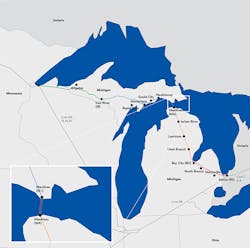Enbridge keeps Line 5 pipeline operating amid court fight over shutdown order
Enbridge Inc. kept its Line 5 crude oil pipeline operating May 12 as the company fought in court against Gov. Gretchen Whitmer’s order to close the line.
Whitmer in November said she was revoking the company’s 1953 easement for the pipeline crossing under the Straits of Mackinac. She gave the company until May 12 to shut the line down, but Enbridge has insisted she does not have the authority to force a closure.
“Enbridge has a responsibility to the people of Michigan and the Great Lakes region, and will continue to operate Line 5 safely, reliably and affordably to fuel the region’s economies,” said Vern Yu, Enbridge executive vice-president, in a May 12 statement released by the company.
The first legal question is: Will the fate of the line be settled in federal or state court?
Whitmer in November filed a complaint in a state circuit court seeking an injunction and declaratory order backing up her decision to revoke the easement. Enbridge responded by filing in federal court to seek an order that federal law and regulation preempt state law and regulation for the interstate and international pipeline.
Whitmer filed a motion in the same federal court seeking to have the case remanded to state court. The remand request became the first order of business for the federal fight.
The litigation takes the form of dueling cases, Enbridge v. Whitmer and Michigan v. Enbridge, in the US District Court for the Western District of Michigan.
Arguments and counterarguments
US District Judge Janet Neff in February set a schedule for the parties to argue over the motion to return the case to state court. In March, Michigan filed its argument for remand, saying the governor’s order is a matter of state law to be enforced by state courts. That was followed by briefs in support of Michigan’s position by a coalition of 16 states and, separately, by an environmental activist coalition.
In April, Enbridge responded with its brief arguing that a federal agency, the Pipeline and Hazardous Materials Safety Administration (PHMSA) is Line 5’s safety regulator, not the government of Michigan.
In early May, briefs were filed in support of Enbridge’s position by the government of Canada, the states of Ohio and Louisiana, the United Steelworkers and North America’s Building Trades Unions, and the chambers of commerce of the US, Canada, Michigan, and Ohio.
The last step in the briefing schedule will be for Michigan can file a reply by June 1 to Enbridge’s arguments.
Meanwhile Enbridge continues to make progress on getting the permits it needs for its plan to build a tunnel under the Straits of Mackinac to give Line 5 a safer crossing. The line has operated for about 68 years with a crossing on the bed of the straits, not beneath the bed. The plan received approval from the Michigan Department of Environment, Great Lakes, and Energy for some of the permits (OGJ Online, Feb. 3, 2021).
Line 5 normally carries about 540,000 b/d of crude oil and propane. It serves 10 refineries to varying degrees, in Michigan, Ohio, Pennsylvania, Ontario, and Quebec, according to the operator. It is notably important as the source of propane for residents of the Upper Peninsula of Michigan.
About the Author
Alan Kovski
Washington Correspondent
Alan Kovski worked as OGJ's Washington Correspondent from 2019 through 2023.
